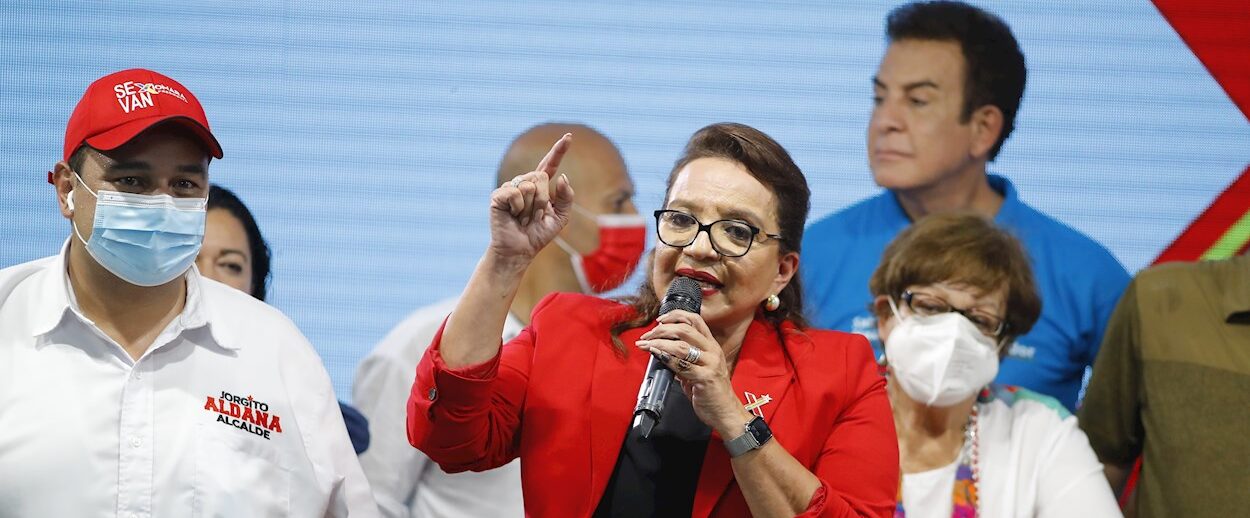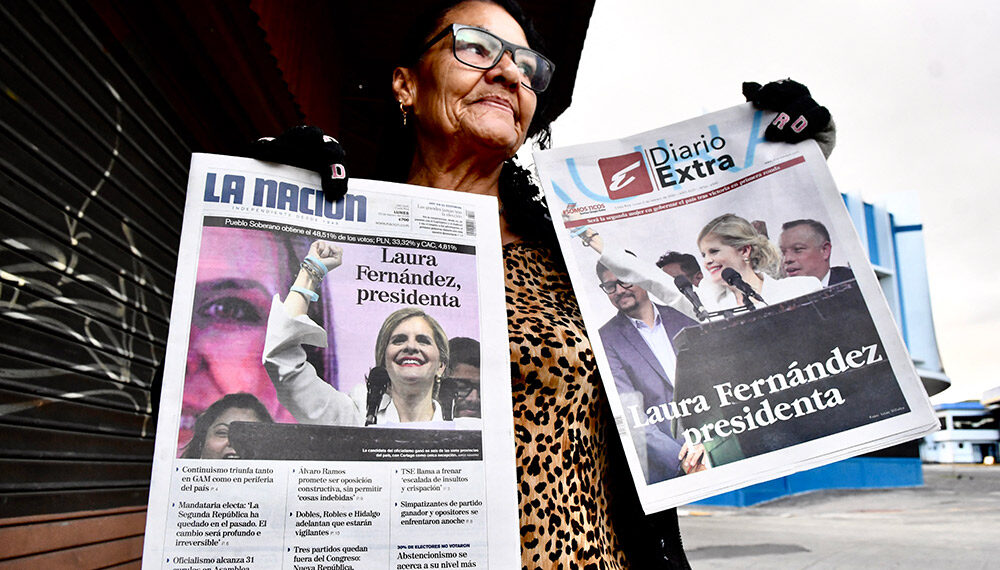Central America
Opposition candidate takes big lead in Honduras presidential poll

AFP
Left-wing opposition candidate Xiomara Castro took a commanding lead over the ruling party’s Nasry Asfura in Honduras’ presidential election on Sunday, preliminary results showed.
With 40 percent of votes counted, former first lady Castro had taken almost 53.5 percent with the National Party’s Asfura a distant second out of 13 candidates with 34 percent, according to a National Electoral Council (CNE) live count.
Castro, whose husband Manuel Zelaya was deposed in a coup in 2009, is hoping to become the first female president of Honduras.
The news sparked scenes of celebration in the capital Tegucigalpa, with supporters setting off fireworks and honking their horns.
“Good night, we’ve won,” said Castro, addressing her supporters.
It was a far cry from the deadly protests that broke out four years ago when Juan Orlando Hernandez won a second successive term amid accusations of fraud. More than 30 people died as authorities cracked down on a month-long protest.
Reports of intimidation and violence in the buildup to this election led to fears the vote could spark fresh unrest.
Castro and Asfura both called for calm as they cast their votes, but the National Party (PN) leadership broke election rules by declaring victory less than an hour after polls opened, earning a rebuke from the European Union observer mission.
CNE president Kelvin Aguirre said “historic” numbers had voted, with a turnout of 62 percent of 5.2 million registered voters.
– ‘Not one drop of blood’ –
The opposition had expressed fears the poll could be rigged to keep the PN in power, which would almost inevitably prompt street protests.
Political analyst Raul Pineda, a former PN legislator, predicted a defeat for Castro, even a legitimate one, would trigger violence.
“We want this to be a civic event, in peace and tranquility,” said Castro as she voted.
“Peace and tranquility are priceless, and listen to me well: not one drop of blood is worth it,” added Asfura, the outgoing mayor of Tegucigalpa.
But residents of the capital were on tenterhooks.
“It’s worrying,” Luis Gomez, 26, told AFP from the gang-ridden Tegucigalpa neighborhood of La Sosa. “I live day to day (and) it would hurt us if there were disturbances.”
The country has been hit hard by gang violence, drug trafficking and hurricanes, with 59 percent of the 10 million people living in poverty.
Washington has been keeping a close eye on the election.
Honduras has been the starting point for a wave of migrant caravans trying to reach the United States.
Pineda said Washington had put pressure on Honduran authorities to ensure a free and transparent vote to avoid the trouble that broke out in 2017.
Some 18,000 police and as many soldiers are on duty nationwide.
Voting took place calmly in the capital.
“Regardless of who wins, we’re brothers, we’re all Hondurans and need to respect each other,” said Leonel Pena, 57, a carpenter in a poor neighborhood.
After almost a dozen years of PN rule, many voters said it was time for change.
“We’ve tried this government for 12 years and things have gone from bad to worse,” said Gomez. “We hope for something new.”
– ‘No narco-states, only narco-governments’ –
The PN has been in power since Zelaya was ousted in a 2009 coup supported by the military, business elites and the political right.
Corruption and drug-trafficking scandals have engulfed Hernandez and many in his inner circle.
“Honduras is internationally known as a narco-state. But there are no narco-states, only narco-governments,” said analyst Pineda.
Hernandez’s brother Tony is serving a life sentence in a US prison for drug trafficking.
Drug barons who the president helped extradite to the US have accused him of involvement in the illicit trade.
Asfura was accused in 2020 of embezzling $700,000 of public money, and the so-called Pandora Papers linked him to influence-peddling in Costa Rica.
The third major candidate in the presidential race, the Liberal Party’s Yani Rosenthal, spent three years in a US jail for money laundering.
He scored just nine percent in preliminary results.
“No more power will be abused in this country,” vowed Castro.
For many voters, the main issue was jobs.
“I want prosperity for us, employment, education,” said Elizabeth Romero, 75, a domestic worker from La Sosa.
Unemployment jumped from 5.7 percent in 2019 to 10.9 percent in 2020, largely because of the coronavirus pandemic, according to a study by the Autonomous University.
The country was also ravaged by two hurricanes in 2020.
As well as the president, Hondurans voted to elect the 28 members of the National Congress and 20 representatives of the Central American parliament.
Central America
Laura Fernández Says She Will ‘Never’ Allow Authoritarianism in Costa Rica

Costa Rica’s president-elect, right-wing leader Laura Fernández, said she will “never” allow authoritarianism under her government, in her first speech after winning Sunday’s presidential election.
Fernández, the political heir of outgoing President Rodrigo Chaves, has been accused by her opponents of seeking to steer the country toward authoritarian rule through her hardline proposals against drug trafficking and plans to reform state institutions.
“I, as the new president of the Republic, will never allow authoritarianism or arbitrariness—things that no one wants in Costa Rica,” Fernández said to cheers from her supporters gathered at a hotel in the capital.
The 39-year-old political scientist criticized her rivals for centering their campaign on what she described as a narrative of “authoritarianism and dictatorship.”
“They tried to scare voters, but the electorate did not fall into the trap,” she said.
Without offering details, Fernández acknowledged that her administration will seek to change the country’s “political rules of the game,” in what she described as a necessary step for Costa Rica, one of Latin America’s most stable democracies.
Central America
Costa Rica Goes to the Polls as Voters Choose Continuity or Change

Costa Ricans head to the polls today to elect the president of the republic and 57 members of the Legislative Assembly for the 2026–2030 term. Voters must choose between continuing the political project of outgoing President Rodrigo Chaves by supporting the ruling right-wing candidate Laura Fernández, or opting for a change in direction proposed by the opposition.
Fernández, representing the Pueblo Soberano Party (PPS), leads opinion polls with close to 40% of voting intention, bolstered by the outgoing president’s approval rating, which exceeds 50%. Chaves is barred from seeking immediate re-election under Costa Rican law.
Trailing far behind is Álvaro Ramos of the National Liberation Party (PLN), with less than 10% support. He is followed by Claudia Dobles of the Citizen Agenda Coalition (CAC), Fabricio Alvarado of New Republic (NR), and Ariel Robles of the Broad Front (FA), each polling between 3% and 5%. Undecided voters, who account for more than 30% of the electorate, could determine the outcome of the presidential race or force a runoff.
In a statement, Costa Rica’s Supreme Electoral Tribunal (TSE) reaffirmed its commitment to transparent and secure elections. “As has been the case for more than 76 years of democratic life in our country, the Supreme Electoral Tribunal guarantees all Costa Ricans that the national elections to be held this Sunday, February 1, will meet the highest standards of security and absolute transparency, allowing us to continue enjoying electoral processes in peace and freedom,” the institution said.
Authorities reported that 53,251 party observers will take part in the electoral process. Of these, 12,472 belong to the Social Christian Unity Party, 11,524 to Pueblo Soberano, 10,451 to the PLN, and 4,141 to the Citizen Agenda Coalition, among others. In addition, six political parties have sworn in 7,520 members of polling station boardsdeployed nationwide.
Central America
U.S. and Guatemala Sign Trade Deal Granting Zero Tariffs to Most Exports

The United States signed a reciprocal trade agreement with Guatemala on Friday, under which 70.4% of Guatemalan exports will enter the U.S. market tariff-free.
Guatemalan President Bernardo Arévalo highlighted the importance of the agreement, stating that it creates a framework of cooperation, certainty, and new opportunities for producers, workers, and entrepreneurs in the country. His remarks were shared in a video published on his official social media channels.
In 2025, 30.3% of Guatemala’s total exports were destined for the United States, amounting to approximately $4.3 billion. As a result, the agreement is expected to directly benefit key sectors of the Guatemalan economy, including agribusiness, manufacturing, and the textile industry.
“Today we have taken another step toward consolidating a country that, when it moves forward united, generates confidence, attracts investment, and creates real development opportunities for all its people,” Arévalo added.
The agreement with Guatemala follows a similar trade deal signed by the United States with El Salvador on Thursday, which includes the elimination of a 10% tariff on Salvadoran imports.
-

 Central America4 days ago
Central America4 days agoPanama Supreme Court Strikes Down Panama Ports Concession as Unconstitutional
-

 Central America4 days ago
Central America4 days agoU.S. and Guatemala Sign Trade Deal Granting Zero Tariffs to Most Exports
-

 International4 hours ago
International4 hours agoSpain Seeks to Ban Social Media Access for Children Under 16
-

 International4 hours ago
International4 hours agoMexico to Send Humanitarian Aid to Cuba Amid U.S. Threats Over Oil Shipments
-

 International4 hours ago
International4 hours agoHypothermia Linked to Most Deaths During New York’s Recent Cold Spell
-

 Central America2 days ago
Central America2 days agoCosta Rica Goes to the Polls as Voters Choose Continuity or Change
-

 International4 hours ago
International4 hours agoPetro Resumes Extraditions, Sends Top Criminal to U.S. Before White House Talks
-

 International3 hours ago
International3 hours agoEpstein Denies Being ‘the Devil’ in Newly Released Video Interview
-

 Central America4 hours ago
Central America4 hours agoLaura Fernández Says She Will ‘Never’ Allow Authoritarianism in Costa Rica
-

 International4 hours ago
International4 hours agoMexico Arrests Suspect in Shooting of Sinaloa Lawmakers
-

 International4 hours ago
International4 hours agoNFL Investigating Emails Linking Giants Executive to Jeffrey Epstein


























